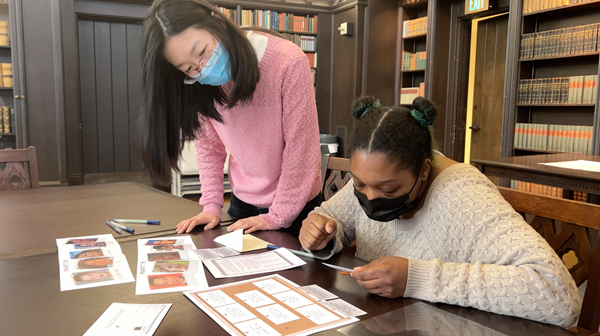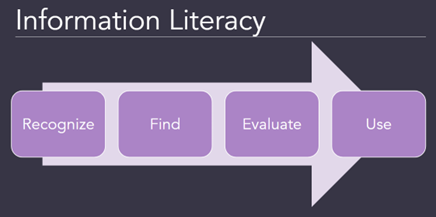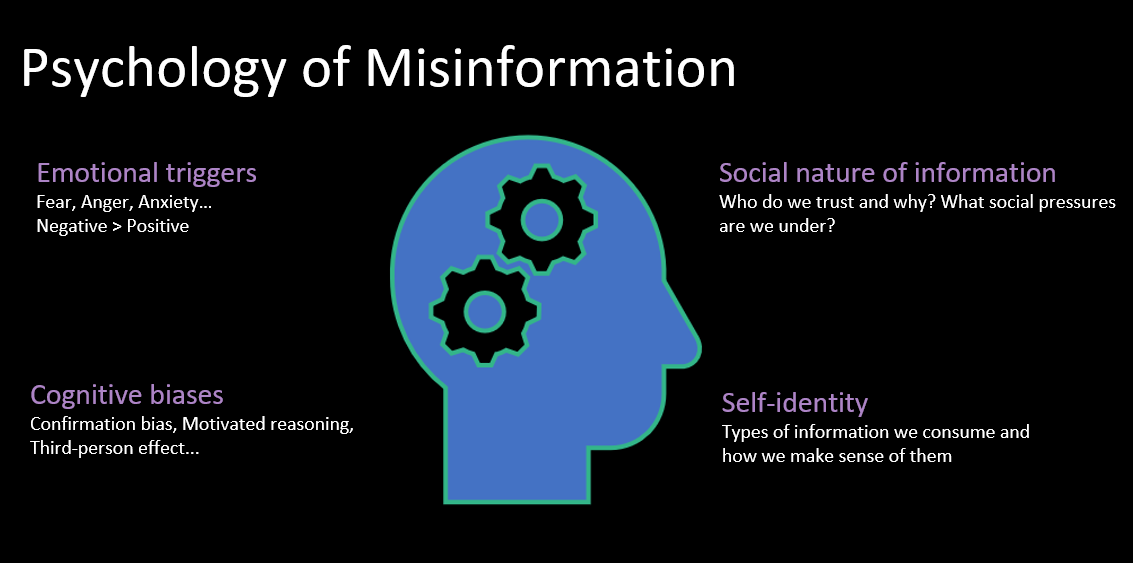The Euphorigen Investigation: Backgrounder

Are there patrons at your library who seem to be influenced by misinformation? Have you tried to provide them with trustworthy information, or offered tips on how to better search? Have you provided digital or media literacy programs that teach critical thinking and other important skills? How successful have any of these approaches been in addressing misinformation in your community?
From library staff
We asked library staff these questions and heard that approaches they’ve used over the years have not been very effective when it comes to misinformation. They offered many insights, based on their front row view of how misinformation impacts their communities. For example:
- People are not interested necessarily in hearing anything that challenges their viewpoint; they really want something that supports it
- The need for resources that delve deeper into the inner workings of misinformation, such as algorithmic targeting, deepfake technology, and social media bots
- The need for programs that are respectful, especially as misinformation has become a political and polarizing topic (need to avoid coming across as preachy or challenging people’s beliefs)
- The need for programs that address misinformation indirectly, perhaps not even using “misinformation or “fake news” in the title or description as this could have a polarizing effect that risks alienating certain groups.
Our conversations with librarians were instrumental in encouraging us to explore different ways to build misinformation knowledge.
From the research
“While facts make an impression, they just don’t matter for our decision-making, a conclusion that has a great deal of support in the psychological sciences”[1] - Claire Wardle and Hossein Derakshan

How do we support people to be better navigators of misinformation? How do we build resilience to misinformation? The answer has almost always been some form of building information, media, and/or digital literacy skills.
Information literacy is a set of abilities requiring individuals to “recognize when information is needed and have the ability to locate, evaluate, and use effectively the needed information,” according to the American Library Association. [2] As a cornerstone of librarianship, building information literacy has proven effective as a general approach across the years. When it comes to the growth of the types of misinformation we witness today, however, there is a growing body of research challenging this conviction.[3] The library staff we spoke with also told us that they have had limited success with this approach.
Why does information literacy face these challenges? Research on why people believe the things they do points to the role of emotions, cognitive biases, personal beliefs, one’s identity, and other factors. We call this the psychology of misinformation.

An alternative approach: Games
Games are a powerful educational tool. From personal health to global geopolitical simulations, games allow people to experience and work through situations in the safety of a game environment. Games on misinformation are also emerging, with some such as Bad News and Harmony Square showing positive, research-based results. [4]
For a topic like misinformation, games offer many advantages:
- Interactive and immersive – People actually experience the emotions, challenges to preconceived beliefs, and other reactions common in misinformation
- Failure – It’s “okay” to make mistakes and people are expected to fail, a particularly important attribute since everyone is vulnerable to being fooled by misinformation
- Difficult issues – Provides opportunities for people to talk about difficult issues since conversation can focus on the fictionalized theme of the game itself
- Fun! – Most importantly, games are fun, offering an appealing format to engage people who might not otherwise be open to participating in a program on misinformation.
Escape rooms: Shared educational adventures
Escape rooms are live interactive adventure games in which a team of players collaborate to solve puzzles and complete an assignment or mission in a set amount of time. A worldwide phenomenon, they are also popular in public libraries, where they have been used for both entertainment as well as for instruction, for example with informal afterschool STEM programs or in support of formal school curricula (Kroski, 2019).[5]
The Euphorigen Investigation
The University of Washington’s iSchool created The Euphorigen Investigation, an online escape room designed to:
- Improve people’s awareness of misinformation technologies and techniques such as misleading data, deepfake images and videos, and social media bots
- Generate reflection on particular emotions and cognitive biases, such as: vulnerability, confirmation bias, and the consequences of unwittingly sharing misinformation
- Change people’s attitudes towards misinformation and potential social media behaviors when engaging with problematic information.
Learn more about the game in this 4-minute video, Break Free from Misinformation in an Escape Room and in the June 14, 2022 WebJunction webinar with the project team.
Beta testing
Our project team from the University of Washington’s Information School conducted a series of beta testing at public libraries. In 2021, we conducted a pilot study in five libraries in Washington State, and in 2022, we conducted a nationwide study with 10 libraries across the U.S.
Overall, we learned that the game is proving effective in achieving the learning goals (though data analysis is ongoing). Here are some sample responses:
I was struck by how quick I was to think the game was over when we found the "deep fake." It matched what I expected to find, so I didn't think any more about it. I did think later about how often I might do that in my real life. I actively try to stop myself from just reinforcing my own beliefs, but it's human nature, I think.
It pointed out to me how my bias might affect how I receive certain kinds of information. I didn't realize the level of sophistication and trickery that goes into spreading misinformation - my tendency is to think that people who are susceptible to misinformation are either not very intelligent or educated, but I think that feeling comes from people believing in some of the more outlandish ideas out there.
I was aware of misinformation, especially misinformation from bot accounts and misleading representations of data. This exercise helped give me more knowledge to combat this misinformation, allowing me to identify it and thus become less susceptible to it.
For me, it was a reminder that a lot of things online can be fake no matter how you think about it and you really have to check for evidence if it's true or not. I can unintentionally spread misinformation (even if it's good) and won't find out or I could face consequences.
Second, we received lots of feedback on the game itself, allowing us to make a number of improvements.
Lastly, we learned about the nuts and bolts of libraries offering Euphorigen as an online program. We incorporated success tips and addressed challenges when finalizing the training guides, game guides, debrief questions, resource kit, and other resources.
Now you can host a game at your library
We have now launched the online and in-person versions of Euphorigen for libraries, schools, museums, civil society organizations, and other institutions with educational missions. Go to lokisloop.org and sign up to be a game host for free. You will get access to the online version of the game, links to download the in-person game, and resources to help you successfully host the game.
References
Beene, S., & Greer, K. (2021). A call to action for librarians: Countering conspiracy theories in the age of QAnon. The Journal of Academic Librarianship, 47(1), 102292. https://doi.org/10.1016/j.acalib.2020.102292
Jack, C. (2017). Lexicon of lies: Terms for problematic information. Data & Society. https://datasociety.net/pubs/oh/DataAndSociety_LexiconofLies.pdf
Kroski, E. (2019). Escape Rooms and other Immersive Experiences in the Library. ALA Editions.
Lewandowsky, S., Ecker, U. K. H., Seifert, C. M., Schwarz, N., & Cook, J. (2012). Misinformation and Its Correction: Continued Influence and Successful Debiasing. Psychological Science in the Public Interest, 13(3), 106–131. https://doi.org/10.1177/1529100612451018
Lor, P. J. (2018). Democracy, information, and libraries in a time of post-truth discourse. Library Management, 39(5), 307–321. https://doi.org/10.1108/LM-06-2017-0061
Nickerson, R. (1998). Confirmation Bias: A Ubiquitous Phenomenon in Many Guises. Review of General Psychology, 2, 175–220. https://doi.org/10.1037/1089-2680.2.2.175
Pennycook, G. (2018). A Perspective on the Theoretical Foundation of Dual Process Models, Dual Process Theory 2.0 (p. 34), Routledge. https://doi.org/10.4324/9781315204550-2
Pennycook, G., & Rand, D. G. (2019). Lazy, not biased: Susceptibility to partisan fake news is better explained by lack of reasoning than by motivated reasoning. Cognition, 188, 39–50. https://doi.org/10.1016/j.cognition.2018.06.011
Revez, J., & Corujo, L. (2021). Librarians against fake news: A systematic literature review of library practices (Jan. 2018–Sept. 2020). The Journal of Academic Librarianship, 47(2), 102304. https://doi.org/10.1016/j.acalib.2020.102304
Roozenbeek, J., & Linden, S. van der, & Nygren, T. (2020). Prebunking interventions based on “inoculation” theory can reduce susceptibility to misinformation across cultures. Harvard Kennedy School Misinformation Review. https://misinforeview.hks.harvard.edu/article/global-vaccination-badnews/
Roozenbeek, J., & Linden, S. van der. (2020). Breaking Harmony Square: A game that “inoculates” against political misinformation. Harvard Kennedy School Misinformation Review. https://doi.org/10.37016/mr-2020-47
Ștefăniță, O., Corbu, N., & Buturoiu, R. (2018). Fake News and the Third-Person Effect: They Are More Influenced Than Me and You. Journal of Media Research, 3(32), 5-23. http://doi.org/10.24193/jmr.32.1
Sullivan, M. Connor. (2019). Why librarians can’t fight fake news. Journal of Librarianship and Information Science, 51(4), 1146-1156. http://doi.org/10.1177/0961000618764258
Shane, T. (2020) The psychology of misinformation. First Draft News. https://firstdraftnews.org/long-form-article/the-psychology-of-misinformation/
Sullivan, M. C. (2018). Why librarians can’t fight fake news. Journal of Librarianship and Information Science, 096100061876425. https://doi.org/10.1177/0961000618764258
Taddicken, M., & Wolff, L. (2020). ‘Fake News’ in Science Communication: Emotions and Strategies of Coping with Dissonance Online. Media and Communication, 8(1), 206–217. https://doi.org/10.17645/mac.v8i1.2495
Wardle, C., and Derakshan, H. (2017). Information Disorder: Toward an interdisciplinary framework for research and policymaking. Council of Europe. https://rm.coe.int/090000168076299d
Young, J., Boyd, B., Yefimova, K., Wedlake, S., Coward, C., & Hapel, R. (2020). The Role of Libraries in Misinformation Programming: A Research Agenda. Journal of Librarianship and Information Science. https://doi.org/10.1177/0961000620966650
Footnotes
This project has received funding from the Institute of Museum and Library Services (IMLS) LG-250050-OLS-21.
Images provided by the University of Washington iSchool
Break Free from Misinformation in an Escape Room
Watch the webinar recording from June 14, 2022, to hear how the escape room designers approach teaching about misinformation, learn how libraries are using the escape room with their patrons, and find out how to get started with the Euphorigen Investigation at your library.
